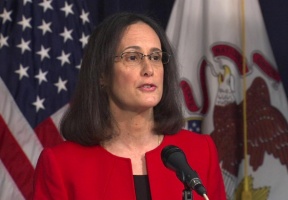

Attorney General Lisa Madigan announced she joined with 10 attorneys general to file a lawsuit against the U.S. Environmental Protection Agency (EPA) for seeking to illegally roll back key climate protection regulations adopted in 2015. Specifically, the coalition charges that the EPA violated the federal Clean Air Act when it rescinded regulations prohibiting the use of hydrofluorocarbons (HFCs) – which are extremely potent climate change pollutants – through guidance, rather than a public rulemaking process, as required by the law. The lawsuit was filed in the U.S. Court of Appeals for the District of Columbia Circuit and charges that EPA Administrator Scott Pruitt’s use of guidance to rescind the 2015 rule violates the Clean Air Act. Under the Act, the guidance should have been handled as a substantive rule with public notice and comment prior to being finalized.
Madigan and the other attorneys general said lifting limits on the use of HFCs will damage efforts to combat climate change. When it finalized its HFC rule in 2015, the EPA estimated that it would avoid 26 to 31 million metric tons of greenhouse gases annually by 2020. A reduction of 30 million metric tons is approximately equivalent to 6.4 million passenger vehicles driven for one year, or the annual energy use for 3.2 million homes. Two manufacturers of HFCs subsequently sued EPA over the 2015 rule. In deciding that suit, the U.S. Court of Appeals for the District of Columbia unanimously affirmed EPA’s legal authority to designate HFCs as prohibited replacements for ozone-depleting substances. However, in a split decision, the court also ruled that the EPA lacked authority to require a manufacturer that has already replaced an ozone-depleting substance with HFCs to switch to a safer alternative. The court partially vacated the rule – solely with respect to this requirement – and remanded it back to EPA.











